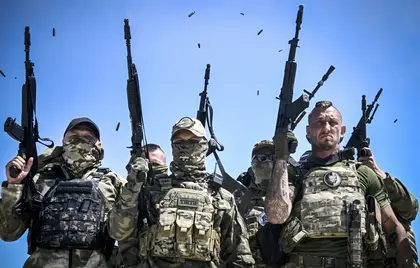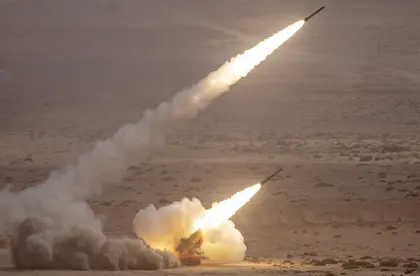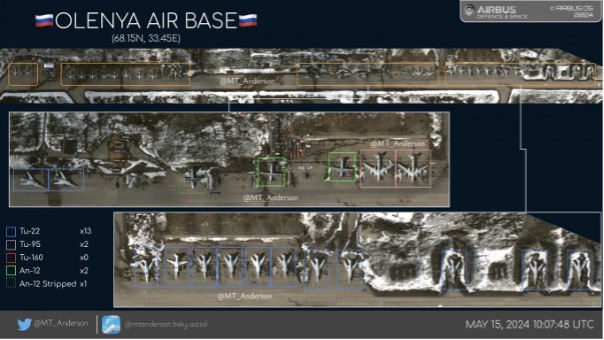In the realm of armed conflict, labels often distort our understanding of the enemy. In the case of the ongoing war in Ukraine, referring to Russian combatants as “orcs” simplifies a complex reality to our detriment, not theirs. Such categorizations not only unify them under a banner of vilification and mockery but also obscure the varied nature of those who fight.
The Russian forces are a motley composition: some are conscripts, some convicts, some are professional soldiers, and many are reluctant participants coaxed, even tricked on to the battlefield. Some are drawn from external nations such as India, Nepal, Cuba, Sierra Leone and Somalia, and many are outright mercenaries. The Wagner Group, known for its brutality and disregard for human rights, serves as a prime repugnant example of the latter.
JOIN US ON TELEGRAM!
Follow our coverage of the war on the @Kyivpost_official.
The term “orc” conjures images of malevolence and mindless aggression akin to the orcs from Peter Jackson’s adaptation of JRR Tolkien’s ‘Lord of the Rings’ – attributes that dangerously underestimate the foe.
It is essential, as the scholars of war have taught throughout the ages, to know one's enemy genuinely to ensure strategic superiority. Misjudgments about the nature of Russian forces only serve to weaken one’s psychological position, granting them the element of surprise and the opportunity to exploit underestimations. For whom with a keen human intellect would really worry about losing a war to mindless orcs?

Video Captures Moment of Airstrike on Kharkiv Hypermarket
By accurately calling them invaders instead of orcs, we acknowledge the reality of their actions without imbuing them with an undeserved mystique of otherworldly evil, stupidity or cohesion.
Complexities of the enemy
The war has seen Russian tactics evolve significantly, mostly through hard failure in the face of a determined, brave and righteous defender. Russian President Vladmir Putin’s forces that once lumbered, single column, into Ukraine are not the same as those now entrenched within it. They are learning – adapting to modern trench warfare, grasping the use of drones, modifying their military hardware and becoming battle-hardened through continuous engagement. This evolution in their military competence demands a corresponding shift in how these invaders are perceived and thus engaged.
By rejecting labels like “orc,” we rightly challenge the illusion that this conflict pits absolute good against pure evil. Such narratives, though appealing for their simplicity, ultimately distort public perception and influence policy erroneously. The reality is a war against a determined invader – quick to adapt to modern warfare's intricacies – whose command structure often uses barrier troops to mercilessly push the "cannon fodder" infantry into what is so often unforgivingly referred to as the meat grinder.
To misjudge them as mere embodiments of mythical evil is not just an error in naming; it is a strategic mistake.
To properly understand the Russian forces, we must look beyond one-dimensional labels and examine the complexities of their composition and leadership. In understanding the Russian forces for what they are – a disparate group united under duress by opportunistic and ruthless leadership – we can better tailor our responses, predict their movements, and counter their strategies effectively.
It's critical to acknowledge that the Russian forces are ultimately acting under the direction of Putin's criminal regime – centered on policies which have been marked by a callous disregard for human life and a willingness to inflict immense suffering on the Ukrainian people.
The targeting of civilians, the use of banned weapons, the forced deportation of Ukrainians to Russia – even small children and babies – and the summary execution of prisoners of war in contravention of international rules of war, are all testament to the cruelty and moral bankruptcy of Putin's dictatorship.
These actions are not the result of a few rogue elements within the Russian military, but rather a reflection of a systemic problem that starts at the very top.
While the Russian forces may occasionally behave like the stupid, monstrous “orcs” of fantasy, it is essential to understand that they are not inherently so. Their actions are a consequence of the corrupt, foul and ruthless leadership that commands them. By holding Putin and his inner circle accountable through war crimes tribunals, and other measures, we can dismantle the structures that enable such atrocities and work towards ending this war.
The views expressed are the author’s and not necessarily of Kyiv Post.
You can also highlight the text and press Ctrl + Enter






